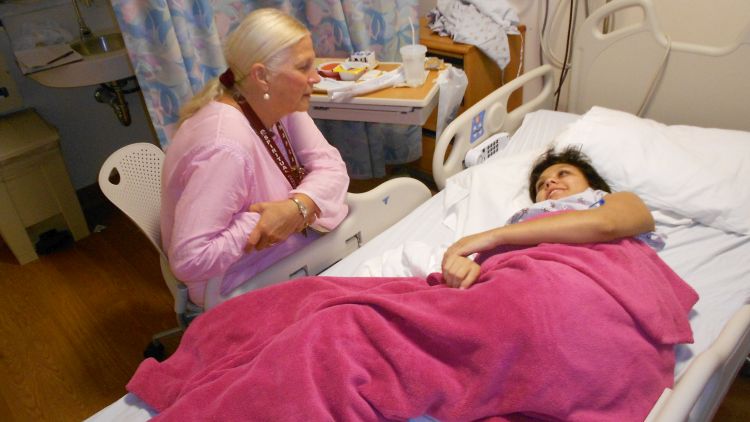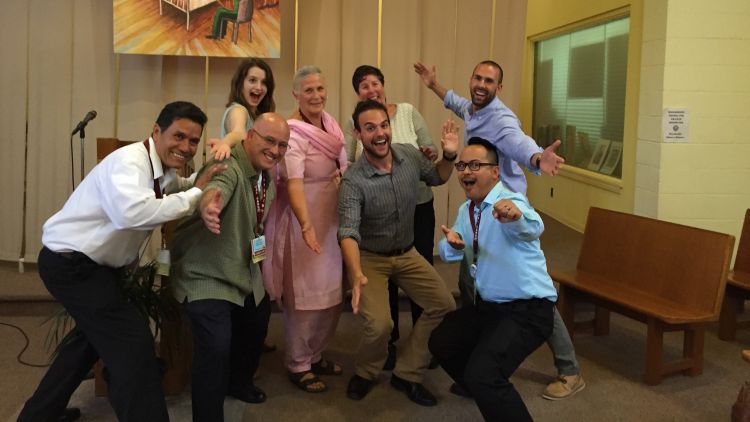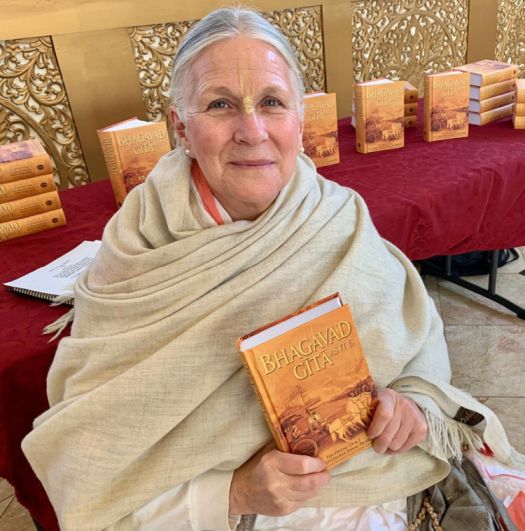Karuna Care Trains Devotees to Offer Emotional and Spiritual Support
By Madhava Smullen | Дек 27, 2019

A new ISKCON-endorsed online training program, Karuna Care Education (KCE), is equipping students with the basic tools to offer people in crisis competent, well-informed emotional support and spiritual care. https://karunacare.iskcon.org/
KCE provides introductory, lay interfaith ministry education for second-initiated ISKCON devotees who wish to provide compassionate care in hospitals, hospices, prisons, airport chapels, college campuses, psychiatric hospitals, homeless shelters, group homes, assisted living facilities, police departments, fire departments, the military, religious communities, and of course fellow ISKCON devotees going through times of personal difficulty and crisis.
Karuna Care Director and Training Supervisor Rambhoru Dasi, a disciple of Srila Prabhupada, is a Board Certified Chaplain and a certified ACPE Educator in Clinical Pastoral Education. She served as resident senior chaplain at Virginia Commonwealth University starting in 2007, and in 2010 became the Director of the St. Camillus Center for Spiritual Care in East Los Angeles.
Currently on a leave of absence from her directorship at St Cammillus to care for her elderly parents, Rambhoru is now counseling congregational members at the ISKCON of DC temple in Potomac, MD. She is also providing spiritual care and counseling to airport staff and passengers at the Dulles International Airport in Washington, DC on behalf of ISKCON.
“I wanted to transform what I’ve been doing professionally into service to Srila Prabhupada’s mission,” she says. “And that’s how Karuna Care Education evolved.”
Since it is very hands on, a maximum of just twelve students will be able to take the Karuna Care program at a time. Applicants must have a Bhakti Shastri certificate to show that they have studied Srila Prabhupada’s books, and must be Brahmana initiated, since care institutions require that one be an ordained pastor. They must also have good communication skills, genuinely like people, and be emotionally available.
The Karuna Care training will comprise of two semesters, each twelve weeks long. In 2020, the first semester will run from April 7th to June 24th, and the second from July 14th to September 29th.
In the first semester, the students will explore their own grief and loss experiences, which is essential to being able to listen to other people’s pain. They’ll learn listening skills, how to start a pastoral conversation, and the difference between social and pastoral conversations – one is about externals, while the other is about the patient’s internal life.
Students will also learn how to manage cultural differences; how to communicate and even pray with other faiths.

Rambhoru (center) with a pastoral education class
In the second semester, Rambhoru will dive into more specifics, such as issues surrounding people who have post-traumatic stress or have lost a limb; who have been abandoned, divorced, or are going through intermarital conflict; who are suffering from anxiety or depression; and who are dying or have lost a loved one.
She’ll also discuss how to specifically care for devotees going through these experiences, including keeping confidentiality, and what not to say.
“One devotee whose husband died tried to come to the temple,” Rambhoru recalls. “After three days, everyone she talked to said, ‘Get over yourself! Why are you grieving? He’s not the body.’ She didn’t come to the temple again for three years, because she could not bear the things people would say to her.”
Throughout both semesters, interpersonal skills will be taught, such as how to create connections with people, and how to create clear boundaries. Self-care – how to not become burdened with other people’s problems – is also an important component.
For now, the program will remain consigned to North America to avoid timezone difficulties. It will be taught via the Canvas Learning Portal and will include weekly two-hour peer group sessions using Zoom video-conferencing, individual consultation sessions with Rambhoru, required reading, reflection papers, and study of compassionate care theory through behavioral science presentations, watching video clips, and live didactics.
In addition, the program will include getting practical experience of compassionate care (a minimum of four hours per week) by volunteering in the spiritual care department at an institution that provides help to suffering people. Students will then write and present case studies based on their experience, and receive feedback from the group.
Upon completing their Karuna Care training, devotees will be eligible to offer pastoral care at hospitals, prisons, hospices, nursing homes, homeless shelters, airport chapels, and any other such institutions.
“It’s a different, more relational entry point,” says Rambhoru. “It opens the door to meaningful conversations about existence, about God, about suffering; and it allows you to explore with them, and to add insight and wisdom to their life.”

Rambhoru Dasi draws from the wisdom of Bhagavad-gita As It Is to offer solace to patients
It’s important however, that devotees understand how to use such an opportunity for outreach, but not for proselytizing. “Some may want to do this work because they’re thinking, ‘Oh, I can sell a lot of books!’” Rambhoru says. “No, that’s not what we’re doing. We’re creating relationships.”
Of course, there may be a natural opening to offer a book, but if there is not, the main principle is to teach by example. “In chaplaincy, we always use the motto of St. Francis: ‘Preach all the time, and if necessary, use words,’” she explains. “That is also Lord Chaitanya’s mission and message. Rather than talking about unconditional love, you embody it by the way you behave, by the way you care. In the Chaitanya Charitamrita, for example, you see Lord Chaitanya embracing beggars.”
Rambhoru also wants to make it very clear that Karuna Care is simply an introductory program for lay ministers that gives them the basic tools and endorsement to start on their path – it does not make them certified counselors.
“The two semesters equal 300 hours of education, which will count towards your credit if you decide to continue your education in chaplaincy,” she says. “To become a board certified chaplain, you need 72 academic credit hours, or 7,200 clock hours. But I have spoken to the National Association of Professional Chaplains, and they are willing to create a pathway for devotees to become board certified, if they keep a portfolio of all the mentoring, workshops and classes they’ve done. So things like VIHE, Oxford Centre for Hindu Studies’ online program, Bhakti Sastri, Grihasta Vision courses, and ISKCON communications courses will count.”
In the interim, Rambhoru plans to make herself available to graduates of her course for monthly Skype or Zoom calls where they can discuss difficult cases. She also hopes to offer an in-person conference or workshop once a year.
Eventually, she plans to write books on the subject of compassionate care, so that her knowledge will be available after she is gone, as well as to train other educators to keep the Karuna Care program going long into the future.
To apply for the Karuna Care Educational program please visit: https://karunacare.iskcon.org/admission/















